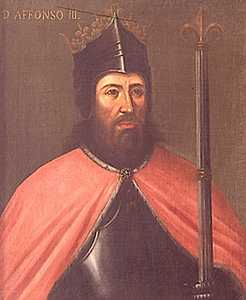Afonso III of Portugal
|
|
Afonso III of Portugal - Alfonso, Alphonso - the Bolognian (Port. o Bolonhês) or the Brave (Port. o Bravo), the fifth king of Portugal (May 5 1210 in Coimbra – February 16 1279 in Alcobaça, Coimbra or Lisbon). He was the son of King Afonso II of Portugal and his wife, Urraca of Castile; he succeeded his brother, King Sancho II of Portugal in 1247.

|
As the second son of King Afonso II of Portugal, Afonso was not expected to inherit the throne, which was destined to go to his brother Sancho. He lived mostly in France, were he married Matilda, the heiress of Boulogne, in 1238, thereby becoming Count of Boulogne. In 1246, conflicts between his brother, the king, and the church became unbearable. Pope Innocent IV then ordered Sancho II to be removed from the throne and be replaced by the Count of Boologne. Afonso, of course, did not refuse the papal order and marched to Portugal. Since Sancho II was not a popular king, the order was not hard to enforce; he was exiled in Castile and Afonso III became king in 1247. To ascend the throne, he abdicated from the county of Boulogne and later (1253) divorced Matilda. In 1253 he married Brites (Beatrix), an illegitimate daughter of King Alfonso X of Castile. Determined not to commit the same mistakes as his brother, Afonso III paid special attention to what the middle class composed of merchants and small land owners had to say. In 1254, in the city of Leiria, he held the first session of the Cortes, a general assembly, comprised of the nobility, the middle class and representatives of all municipalities. He also made laws intended to restrain the upper classes from abusing the least favoured part of the population. Remembered as a notable administrator, Afonso III founded several towns, granted the title of city to many others and reorganized public administration.
Secure on the throne, Afonso III then proceeded to make war with the Muslim communities that still thrived in the south. In his reign the Algarve became part of the kingdom following the capture of Faro - Portugal thus becoming the first Iberian Kingdom to complete his Reconquista. Following his success against the Moors, Afonso III had to deal with a political situation arising from the borders with Castile. The neighbouring kingdom considered that the newly acquired lands of Algarve should be Castilian, not Portuguese, which led to a series of wars between the countries. Finally, in 1267, a treaty was signed in Badajoz, determining that the southern border between Castile and Portugal should be the River Guadiana, as it is today.
Afonso's marriages and descendants
- First wife: Matilda, countess of Boulogne
- Roberto (1239)
- Second wife: princess Beatrix of Castile (1242-1303)
- Branca, princess of Portugal (1259-1321), abbess of the Convent of Huelgas
- Fernando (1260-1262)
- Diniz or Dinis, king of Portugal (1261-1325)
- Afonso, prince of Portugal (1263-1312), married to princess Violante of Castile
- Maria, princess of Portugal (1264-1284), religious in the Convent of Saint John in Coimbra
- Sancha (1264-1279)
- Constance (1266-1271)
- Vicente (1268-1271)
- Natural children (among others)
- Martim Chichorro (1250-1313)
- Urraca Afonso, religious
See also: Kings of Portugal family tree
| Preceded by: Sancho II | King of Portugal | Succeeded by: Denis |
de:Alfons III. (Portugal)
fr:Alphonse III de Portugal pl:Alfons III (król Portugalii) pt:Afonso III de Portugal ru:Афонсу III
